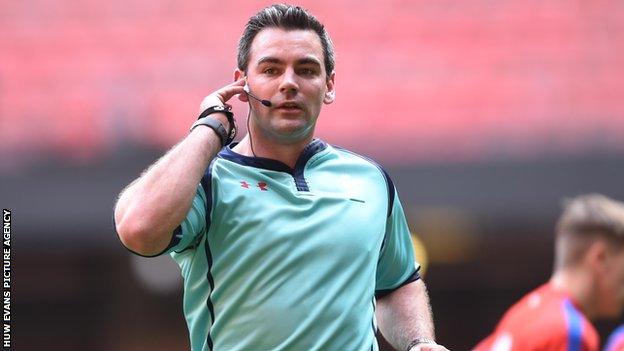Concussion in sport: Ex-Dragons centre Adam Hughes on his rugby brain injuries
- Published
'I played in front of 20,000 people and don't remember' - Hughes
Adam Hughes still cannot remember large parts of the days in which he was concussed as a rugby union player.
Two years after retiring from the sport because of brain injuries, the 30-year-old is now one of six former players joining legal action against the game's authorities for negligence.
Last week, 2003 World Cup winner Steve Thompson and ex-Wales number eight Alix Popham were among eight former players who announced they had recently been diagnosed with the early signs of dementia, saying repeated blows to the head were to blame.
A former Wales Under-20s centre, Hughes suffered several concussive injuries during his career and thinks he had "about eight complete knock-outs".
Although the ex-Dragons player has not received the same diagnosis as Thompson and Popham, he has been advised by medics he is on the same medical trajectory.
"I ended my career at 28 following a particularly bad concussion. It was just one head knock too many," says Hughes.
"I was finding it more and more difficult to recover from each and every bang to the head.
"It snowballed really. At first it was the bigger concussions where I was completely knocked out that took me ages to recover from then over the time even the smaller ones started to have an impact. For the sake of my health, I had to bring it to a halt.
"I had about eight complete knock-outs in my career, the worst one was during a pre-season game in 2016 where it took me six months to recover.
"With the other concussions, there are large parts of the days they happened that I have lost forever.
"For example, after one knock-out my only memory is sitting in the stand, it was freezing cold and I had a big coat on. I had no idea how I got there or any recollection of the day up until that point. It was the coaches who told me what happened."
'Pilot dream dashed by brain injury'
While playing, Hughes prepared for life after rugby by training to become a commercial pilot - but his brain injuries dashed those hopes.
Instead, he is now working as a financial adviser and rugby referee.
"My biggest ambition outside of rugby was to become a pilot, these concussions have meant I was unable to make that my after-rugby career," Hughes says.
"I have my licence, but I have had to give that up as one of the biggest side effects I have is that movement leaves me feeling sick, and so clearly flying a plane is a big trigger.
"I am now a successful financial adviser and really enjoy helping people and players plan for their future. I hope to be able to do that for many more years to come.
"For me, no longer playing rugby has had a positive impact as I no longer carry that weight of worry about getting another concussion, although I know that enough damage has already been done.
"To keep myself fit I referee rugby games. Naturally, if I see a player with a bang to the head, then they're off, but then I sometimes face a torrent of abuse and argument from their coaches and doctors.
"It is precisely that old-school mentality that has to change."

After retiring from playing, Adam Hughes refereed the 2019 Welsh Schools Rugby Union Cup final
Thompson's former England team-mate Matt Dawson said last week he does not feel let down by rugby even if he develops long-term brain damage as a result of playing the game.
Speaking on the Rugby Union Weekly podcast, Dawson said it was his choice to play the game, and he "knew what he was getting into".
Asked about views such as Dawson's, Hughes says: "Of course, I know people will say that I knew what the risks were. Yes, I did, but that misses the point completely.
"If there were opportunities to make the game safer, and I believe there were, then it was incumbent on those with power to do so.
"The game still has a very long way to go in terms of education about concussion.
"I'm not yet suffering in the way that some of the older rugby players are, but I am still adapting what I do in everyday life to make sure I do not trigger the symptoms, and I am still learning where my limits are.
"I had to completely build up my threshold to exercise from scratch, and this is an on-going battle for me.
"If I push those limits too far, then the rest of the day will be spent in a dark room feeling sick.
"The thing with concussion is that it is the invisible injury. It's so much easier to treat a broken bone or torn muscle.
"During the early part of my career, you were given a simple pitch-side concussion test, such as being asked if you knew which ground you were at and what the score was. If you knew, you got back on the field, but those were the guidelines we were all working too.
"If I had my time all over again, I would definitely have left more time in between going back to play or train after a concussion."